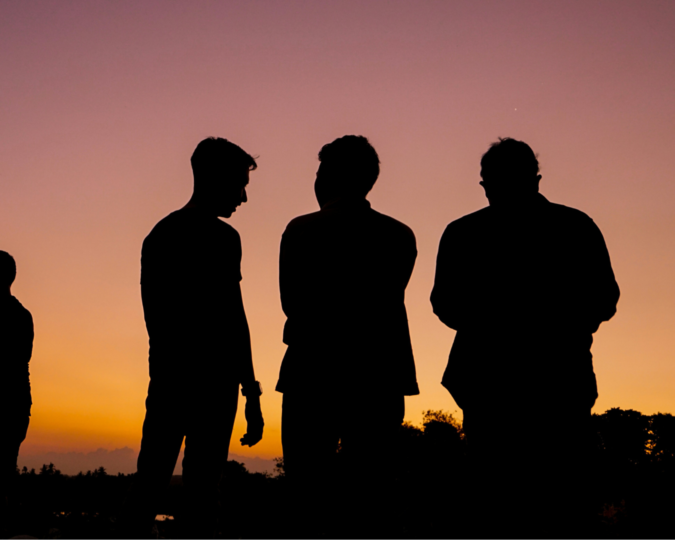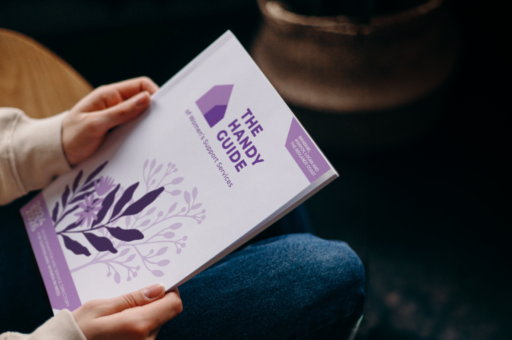
Unpacking toxic masculinity with Dave Kramer
Apr 04, 2024
Toxic masculinity, or unhealthy masculinity, is a complex term that describes harmful aspects of masculinity that are deeply ingrained in our culture. By being able to recognise and speak up against toxic masculinity when we see it, we can make strides toward a safer, equitable and more inclusive society.
Dave Kramer, a Behavioural Scientist and Ambassador for Small Steps 4 Hannah, knows firsthand the destructive impact of toxic masculinity. We sat down with Dave to discuss how society contributes to its perpetuation, how to speak up about it, and why the term itself may be problematic.
In this article:
- Dave’s story: The importance of speaking up
- What is toxic masculinity?
- How unhealthy masculinity is created
- How to hold your mates accountable
- Halting the cycle
Dave’s story: The importance of speaking up
Dave Kramer is the first to admit that holding a friend accountable isn’t an easy thing to do.
His advocacy journey took on profound significance after the tragic death of his friend, Hannah Clarke, and her three children at the hands of her ex-partner Rohan Baxter in February 2020.
“I was very close with Hannah,” Dave says. “I was also friends with Baxter… And I felt that need to ‘speak up’ a lot throughout the time I knew him. But what stopped me was that he was doing what everyone else was doing.
“One of the challenges we have in speaking up… is that we create a distance, a cognitive dissonance. We say, ‘well, I’m not part of the problem, it’s not my fault’. And that gets in the way of actually saying to our mate, ‘you can do better’.”
Looking back now, with the benefit of hindsight, Dave acknowledges moments where he could have said something – moments when his silence instead gave Baxter tacit approval.
“It wasn't until I started doing this work that I recognised all the things that I participated in that I didn't think were a big deal – the jokes I laughed at, the sexist remarks I let slide – were points where he got permission from me to take the steps that he took,” Dave says.
For Dave, speaking up means owning our role in perpetuating a culture of violence against women. “It’s not easy, but it’s necessary if we’re going to change the culture.”
What is toxic masculinity?
Toxic masculinity refers to a set of expectations or attitudes society has about what it means to be a man. It’s a phrase that often embodies aspects of stereotypically-masculine qualities, such as being tough, dominant, and never showing emotions. These unhealthy and unrealistic stereotypes can lead to harmful behaviours, including violence and a sense of entitlement towards women.
But Dave says the first thing you should know about ‘toxic masculinity’ is that the name itself can be quite problematic.
“When we use those words, whether in school groups or men’s gatherings, the response is often defensive, dismissive, or people just switch off completely,” Dave explains. “And that doesn’t really get us anywhere in solving the problem.”
Instead, Dave suggests using language that focuses on behaviours, rather than labeling individuals.
“Terms like ‘unhealthy’ or ‘restricted’ masculinity tend to resonate better. It’s not about labeling people as toxic; it’s about recognising harmful behaviours,” he says.
“We’re opening up discussions that many haven’t explored before, and that approach tends to be more successful in the room.”
How unhealthy masculinity is created
Dave says the root of the issue lies in the rigid expectations set by society regarding traditional gender roles.
“If men rigidly believe that this is what it means to be a man and this is what it means to be a woman – ‘she should be quiet, she should be submissive, she should do what she’s told, she should exist to serve men’s needs’ – then they feel more justified in making sexist jokes, or expressing anti-feminist views, and even posting such beliefs on platforms like Facebook,” he says.
“And when they do that and they receive no pushback, they take that as permission to maintain the belief.”
The most common manifestations of unhealthy masculinity include sexism, opposition to women in leadership, victim-blaming in cases of domestic violence or harassment, and the suppression of emotions, perpetuating the notion that ‘boys don’t cry’.
“We need to think about the problems that arise from this stereotypical view of masculinity,” Dave says. “It can cause men to feel constrained and unable to express certain parts of themselves, such as being caring, kind or nurturing. All these aspects are cut off when you’re in that space.”
Restricted beliefs
Dave says the perception that men should embody traits like being the protector, or the breadwinner of the family, can be problematic and damaging, often leading individuals to resort to toxic methods to solve problems.
“When men feel they can’t express their emotions and believe they must solely provide for their families, what happens when they lose that ability, as many did during Covid?” Dave says.
“Their partners may take on more responsibilities, and as a result, men may feel inadequate and seek ways to escape.”
This can manifest in controlling behaviours toward their partners – hindering their ability to pursue careers, spend time with friends, or even dress freely due to fear and control. Alternatively, these pressures can turn inward, leading to self-harm or addiction as coping mechanisms.
“When emotional expression is stifled,” Dave says, “men become more prone to resorting to violence, either against others or ourselves.”
From boys to men
Dave says the foundations of masculinity are laid early in life.
“There’s a lot of societal and cultural conditioning that we need to unlearn,” he explains. “We often use gendered language from childhood, with little girls often praised for being pretty and boys for being strong. These early messages shape beliefs, rewarding young men for qualities like strength, resilience, and toughness, encouraging them to compete and dominate.”
This mindset seeps into various aspects of life, from social media to casual lunchroom banter at work.
“From sexist jokes to victim-blaming narratives around violence, it’s all part of a broader pattern that we urgently need to unlearn as a society,” he says.
Ultimately, it’s these rigid belief systems that sustain restrictive and unhealthy versions of masculinity.
“Off the back of that, we see heightened instances of violence, domestic abuse, and even suicide.”
How to hold your mates accountable for unhealthy masculinity
When you’re faced with problematic behaviour amongst friends, Dave says it’s always important to question it.
“If someone in a group makes a sexist joke, for example, instead of responding with something like ‘You’re a sexist pig’, try asking, ‘Well, what did you mean by that?’ Or ‘I thought you respected women. Has that changed?’”
The aim of this approach, Dave explains, is to try to understand the person’s perspective.
“This conversation can happen privately or in front of other people, depending on what is more appropriate,” he says. “But the goal is to get an understanding of where that person is, because each and every one of us are at some point along this spectrum of contributing to unhealthy dynamics.
“Many of us grow up with these rigid gender beliefs about what we’re supposed to be. So when we hear these jokes, some of us may laugh because we recognise the stereotype, rather than because we genuinely believe the stereotype.
“The risk is that if we continue to give permission to those who genuinely believe it, how far does it go?”
Halting the cycle
At Small Steps 4 Hannah, Dave has created the H.A.L.T. program, named in honour of Hannah Clarke and her three children, Aaliyah, Laianah and Trey.
“H.A.L.T. is our respectful relationships programme designed for high schools, starting from students in year seven right through to year twelve,” Dave explains.
While young people can be quite savvy about recognising red flags, Dave says they don’t necessarily know what it looks like to be in a safe relationship.
“They rarely have the chance to explore what safety looks and feels like,” he says. “So, our main focus is on defining the characteristics of a safe relationship and how to actively foster it.
“The most common thing I've been told from young people is that they follow the crowd, even when they know it’s wrong, simply because it feels safer to blend in.
“That’s why simply instructing students to follow certain behaviours isn’t enough. The program is about helping the school to build a community where these behaviours are openly discussed and understood.”
Dave also engages with men's groups, seeking to understand their experiences with masculinity and meet them where they’re at. One key question he poses is, “How is this serving you?”
“We can’t expect change by simply pointing out faults,” Dave says. “We have to walk in the room with empathy and curiosity. For example, I’ll ask them to think about how their role as the disciplinarian in the family may limit their ability to have loving and nurturing relationships with their children.
“When they start to understand that traditional roles – the provider, the protector, the dominant one, the tough one, the strong one – are off the table, they begin to realise that it’s actually not serving them to be this kind of man.”
By encouraging men to reconsider traditional masculinity, Dave advocates for embracing a broader range of qualities beyond the stereotypes.
“By embracing diverse qualities, individuals can find greater fulfilment as partners, fathers and individuals,” he says.
“Whether you’re 15 or 37, we all stumble sometimes. It’s about providing people, whether you’re a man, a woman or anyone else, with the tools to recognise when they’re veering off the path towards an unhealthy relationship and guiding them back to safety.”
If you found this article valuable, please consider sharing it with your network. If you or someone you know needs support, please reach out to one of the following services:
- DV Connect (1800 811 811): Provides crisis support and counselling.
- 1800RESPECT (1800 737 732): A telephone helpline for friends and family to report instances of domestic violence and seek support.
- Relationships Australia QLD (1300 364 277): Offers relationship support and advice to individuals and families across Queensland.
- Mensline (1800 041 612): A national telephone and online support service providing assistance, information and referrals for men in need.




